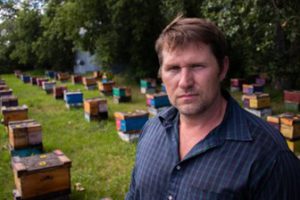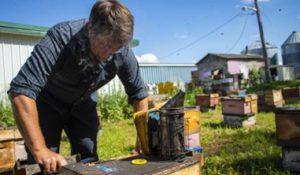A honey of a problem: Manitoba apiaries work to recover from huge winter losses
Producers face bleak prospects if they hit another long, cold winter
Chelsea Kemp · CBC News
Mike Clark stands amid his nearly empty bee hives, hoping that his apiary, which has been raising honeybees since the First World War, can come back from a brutal winter that has ravaged bee colonies across the country — and Manitoba hardest of all.
“Other guys are in production right now to extract honey, and I’m not seeing that we will produce any honey this year,” Clark said.
“We’re hoping that they do make the winter this year. If we do have another heavy loss, it will be the nail in the coffin … that our business won’t be here.”
In a typical August, Clark Apiary in Wawanesa, Man., about 200 kilometres west of Winnipeg, would be a-buzz with bees creating honey. This year the space is quieter as the farm focuses on rebuilding its devastated bee population.

Mike Clark stands amid nearly empty hives at Clark Apiaries in Wawanesa, Man. (Chelsea Kemp/CBC)
Clark says he would like to see the introduction of honeybee imports from the United States to help rebuild dwindling populations. Under current regulations only certified queen bees can be imported from the U.S.
Clark says the apiary is working with the bank to secure a loan, and is hoping government stabilization programs will become available in the form of interest-free loans for commercial beekeepers.
“We’re not really asking for a handout because this isn’t caused by us — this was environmental — that there should be backups in place — that we would pay back these loans — but then they’re available for farmers to take advantage of,” Clark said.

Mike Clark says his apiary, which has been producing honey since the First World War, might not be able to survive another long winter. (Chelsea Kemp/CBC)
Podolski Honey Farms is running about two weeks behind normal because of the late spring, according to owner Bob Podolski.
The apiary began extracting honey in early August but has found very little in the hives.
“On my best case scenario, we do a million pounds … Normally we do 750-850,000 pounds. This year if we do 200,000 we should be lucky,” Podolski said.
Podolski imports bee packages (boxes specially built to ship bees safely and securely that are sold by weight, with roughly 3,000 to 5,000 bees per pound) from New Zealand and Australia, but he would like to see access to American bees.
When the spring arrived, Podolski estimates the farm had lost around 90 per cent of its bees.
“I’ve seen 80 per cent, I’ve seen 70 per cent [in the past], but there was this replacement stock that was available. This year there was not a replacement stock available,” Podolski said.
“Well, if we don’t get replacement stock available from the continental U.S.A. — after 47 years of me milking bees, I don’t know if we’ll be here next year.”
To access the complete article go to;
A honey of a problem: Manitoba apiaries work to recover from huge winter losses | CBC News
We are here to share current happenings in the bee industry. Bee Culture gathers and shares articles published by outside sources. For more information about this specific article, please visit the original publish source: A honey of a problem: Manitoba apiaries work to recover from huge winter losses | CBC News








